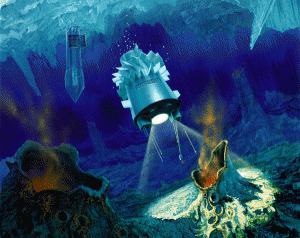SETI 25th Anniversary 3/6: life – what, where, how, when?
SETI Institute Anniversary 2/6: Its Majesty Mars: the Red Planet
February 23, 2010The E-ELT will be in Chile at the Cerro Armazones?
March 4, 2010This is definitely the banner for which I am the least qualified to write about since I am not a biologist. It is, however a very important part of the SETI Institute research that needs to be fully acknowledged and fully described.
Astrobiologists from the SETI Institute dedicate their effort to response to these simples. What is life? When did life appear? Where is it coming from? How did life evolve?
In their lab they analyze samples of organisms such as extremophile, which are known to live at the edge of what normal organisms could tolerate. These “super-organisms” are found in acidic water (hotsprings), at the bottom of the ocean (near the blacksmokers) and deep cave with no natural light. The organisms are identified, analyzed and classified into the complex tree of life. Because astrobiologists want also to understand their limits, they place them in more extreme conditions of temperature, and irradiation by UV. Studying them and observing the strategies they use to survive and grow, SETI astrobiologists can identify where life could be elsewhere on a hostile planet like Mars or in the ocean of icy satellites like Europa. They can also provide to planetary scientists signatures of their presence that could be used to detect them remotely using spacecraft in orbit or mobile stations on the surface.
Life as a simple cell exists on our planet for 3.8 billion years; shortly after the formation of our planet (4.5 billion years old) and the end of the meteorite bombardment. This life thrived into multi-cellular species 1 billion years ago. Because Hominids walked on this planet only 2.5 million years ago, we can conclude that it is very likely that if life exists elsewhere in our galaxy, it will be essentially microbiological.
Two hundred years ago, we did not know that a pond on Earth could be a place where live and grow several species forming a complex ecosystem. Today, we may still be blind and we are unable to see that on our neighborhood planets, in our own solar system, there may be also ecosystems with different type of organisms.
The search for life in our solar system and in our galaxy has just started. This quest will be tedious, complicated and expensive, but the price will be extremely rewarded for all of us, individually, as humanity and also as a civilization. Even if our neighbors are only multicellular organisms or simple cells, their existence will change the perception of our space environment and our role in this galaxy.
Enjoy swimming in the ponds,
Franck M.





1 Comment
Not concerning the subject, just small advise right here. Test your akismet or plug akismet , yours is broken to pieces. You will get horrible quantities of spam if you wont fix it.